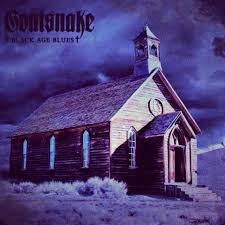BB King is dead, a bad moon is rising, and we’ve all got the Black Age Blues. Cult supergroup Goatsnake return for the first time in over a decade: bigger, brighter, groovier and heavier than before. When guitarist Greg Anderson moved to Los Angeles from Seattle in the late 90s, he transplanted his roaring Sunn O))) amp engine into The Obsessed’s rhythm section chassis, and put Pete Stahl at the wheel. A stalwart of the desert rock scene with a concise remit to out-Ozzy Ozzy himself, Stahl’s natural vocal power, authenticity and sense of composition elevated the band immediately above its volcanic rock peer group. The mix of Melvins sludge, Black Flag urgency and the obscure grooves of the 70s rock underground − Captain Beyond, Buffalo and Sir Lord Baltimore − was left out to bake to perfection in the Mojave sun.
Black Age Blues initially promises continuity: ‘Another River To Cross’ fades in with the piano and Petra Haden’s wailing vocals that were the climax of ‘The River’ from Goatsnake’s last album, Flower Of Disease (2000). Then its first surprise: the acoustic guitar of Slint’s David Pajo recorded outside with running water in the background, resolving itself into a loping muscular riff that Anderson, drummer Greg Rogers and bassist Scott Renner suddenly take up in unison. It’s a hulking, crystal clear statement of intent. Producer Nick Raskulinecz has been on a journey since he cut his teeth on Flower Of Disease fifteen years ago, subsequently working with the Foo Fighters, Alice In Chains and Deftones, but he pays Goatsnake back in kind with a sound that supplies ample power, warmth, breadth and depth.
On their recordings before this Goatsnake relied on two or three musical themes per song at most, but ‘Coffee And Whiskey’ showcases a broader palette and an armoury of supercharged riffs that Anderson has been hoarding all the intervening years he has been deconstructing the sound wave with Sunn O))). It jumps out of the traps with an edgy, jittery swing, then is thrown another way by a surging chorus − "Coffee, whiskey / Til the cows are coming home" – but finally shifts gears into a swaggering two-note throwdown that emphatically hammers the track into the ground. Greg Rogers’ cut-and-dry drumming keeps it honest and nods to John Bonham with a phaser, ‘space drums’ effect in the last turnaround.
The title track is similarly bullish, its opening riff powers up like the introduction to Sabbath’s ‘Children Of The Grave’ crossed with ‘Slippin’ The Stealth’, which opened their first album, I: "Oh, I have to run, and clear my head!" Stahl cries. His delivery is so simple, so heartfelt, that you’re heading to the door with him on your headphones, ready to tear up the tarmac. But the real revelation is the breakdown riff halfway through: a gnarled, sickly slowburner with a sting in the tail; all throttled neck slides, subtle variations and Anderson’s trademark trill. It might be his best ever, and should cause consternation in Eyehategod’s next band meeting when they turn to each other, asking how the fuck they couldn’t come up with anything as grim and soulful on their comeback album last year.
Goatsnake used to be a two-speed band: their tunes either dune buggy head-nodders or miasmic dirges shrouded in palls of Grief. Not anymore: this whole record lunges forward with a propulsive energy that drives through even its slow-mo sections. It’s not that they aren’t guilty of recycling − the same mid-tempo chug of I‘s ‘Mower’ can be heard a couple of times here; does the intro to ‘House Of The Moon’ bring to mind ‘Portraits Of Pain’ from 2004’s often overlooked Trampled Under Hoof EP? Yes, it does. But on that song there’s a brave new element, the singing of Dem Preacher’s Daughters, which adds melodic ballast to the song, laid over a chorus with a plunging lead-weight chord sequence which sounds like it could blast through solid granite on the way to the centre of the earth. The backing singers’ ‘Shine On’ refrain takes the band into another direction which I can only describe as Gospel Doom, signified by the dark hues of the dust bowl church of the album’s cover art. This new sound is consecrated fully on ‘Jimi’s Gone’, a paean to Hendrix where the stellar mid-section sounds like ‘Iron Man’ fronted by multiple Tina Turners (‘Bang, Bang, Shoot!’), decorated with harmonica flourishes and that archaeological rarity from Anderson: a guitar solo (and a tastefully sparse on at that).
I must single Stahl out for praise. Not only the centre of the Rancho De La Luna scene as documented in Dave Grohl’s LA episode of Sonic Highways, he is an immensely talented frontman who pioneered hardcore in Scream. He is affable and humble too, currently road managing several bands including Rival Sons, a group who recreate classic blues rock, whereas in Goatsnake he actually reinvents it. In the liner notes to the reissue of their debut, Anderson credits Stahl for getting to grips with the arrangement of their masterpiece, ‘What Love Remains’. He excels when he’s afforded the space for those long sustained vocal sequences as powerful as "Steals the light from the sun/I need to breathe" from ‘Graves’. Album closer ‘A Killing Blues’ moves malevolently forward like a battalion of black cloud on a summer prairie − invoking Stagger Lee it billows out to encompass the mythology of a style of music Goatsnake seek to take grimly onwards, disappearing to a whisper before the storm bursts: "Lightning, Thunder/ Wash my soul to the Ground". Preach it, brother.
As the rain comes down at the end of the album it signifies that Goatsnake are determined to finish what Black Sabbath started. Not only is Black Age Blues Goatsnake’s best album, it is an instant classic of the stoner-doom hybrid and an earthy, electrifying endgame for rock & roll itself.
<div class="fb-comments" data-href="http://thequietus.com/articles/17960-goatsnake-black-age-blues-review” data-width="550">


